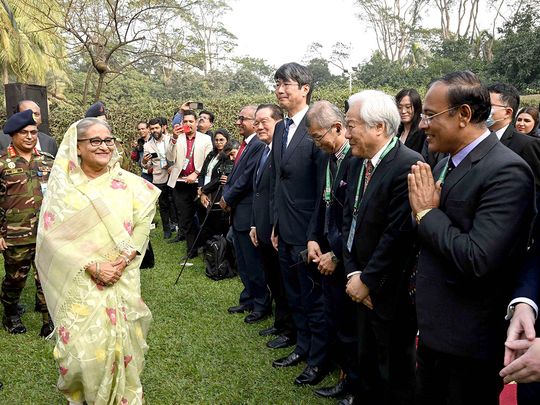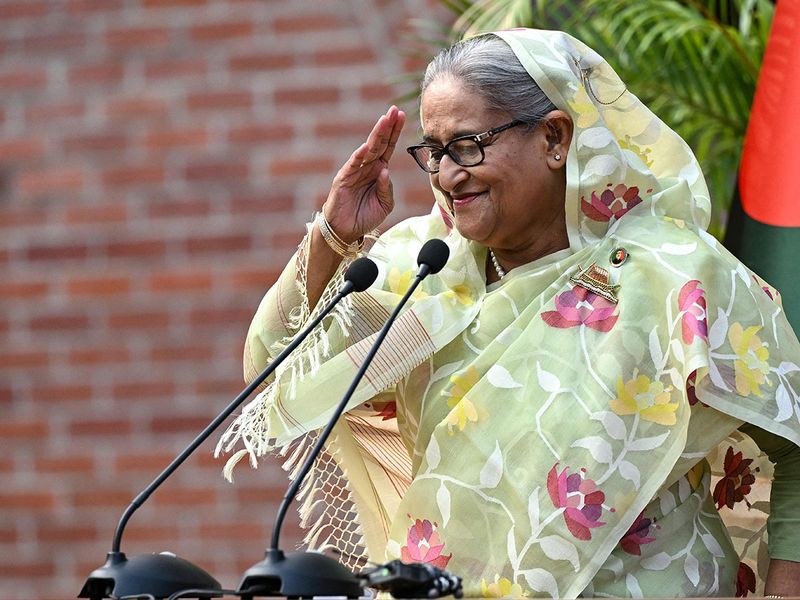
Sunday, January 7. Amid a poll boycott by the opposition Bangladesh Nationalist Party (BNP), voters in Bangladesh cast their ballot in the country’s 12th parliamentary elections. Though the voter turnout was only 40%, the second lowest since the restoration of democracy in 1991, most observers reported free, fair, and mostly peaceful elections.
The results, declared the following day, came as no surprise. Sheikh Hasina, the 76-year old leader of the ruling Awami League party, was re-elected from her pocket borough, the Gopalganj-3 constituency. She polled a staggering 249,965 votes with her nearest rival managing to secure only 469.
After her party’s landslide victory in the general elections, Hasina has become Bangladesh’s prime minister for an unprecedented 5th term.
This makes her not only the longest serving prime minister in Bangladesh, but the longest-serving female head of government anywhere in the world. She has led her country for nearly twenty years, spanning four terms of which the last three have been consecutive.
As the daughter of the assassinated founding father of Bangladesh, Sheikh Mujibur Rahman, she enjoys a huge amount of prestige and goodwill.
Near-absolute grip on power
Most of her family, including her mother, three brothers, two sisters-in-law, several other relatives and members of her father’s personal staff, were also murdered in the August 1975 coup. Rahman, who had returned a hero to head the government of independent Bangladesh in 1972 could rule for less than four years.
But his daughter has made up in ample measure. Becoming the president of Awami League in 1981, Hasina and her party bore the brunt of several regimes that ran Bangladesh for most of the 1980s and 1990s. She also survived a coup attempt in 1984 and a grenade attack in August 2004 that killed 24 or her supporters and injured many more.
Hasina’s party has not only won 222 seats, close to three quarters of the majority in the 300-seat parliament, but also enjoys the support of allies and independents. This makes her grip on power near-absolute despite her victory tally coming down from a whopping 257 out of 300 in the last general elections in 2018.
Hasina is undoubtedly the most successful Bangladeshi prime minister. She is best known for the remarkable progress Bangladesh has made her leadership, not just in its economy, but also in infrastructure, social welfare, health, and education.
Bangladesh’s GDP has grown to over $400 billion in 2024. The per capita GDP at $2,646 is slightly higher than that of India and almost double that of Pakistan.

Tarnishing her reputation
According to the World Bank, poverty in Bangladesh declined from 31.5% in 2010 to 20.5% in 2019. This means that over 15 million people lifted out of poverty. Bangladesh also has better roads, bridges, ports, power plants, and so on.
There are several welfare programmes for disadvantaged sections of society including poor farmers, women, elderly, and children.
Relations with India have improved significantly during her tenure and long-standing border disputes have been settled. Long standing conflicts with indigenous rebel communities in the Chittagong Hill Tracts have also reduced significantly.
Hasina has been criticised for her human rights record but her supporters believe that these incidents have been fomented and instigated by her opponents and enemies of Bangladesh to tarnish her reputation.
Inciting communal violence has been a long-standing political ploy in the subcontinent, going back the colonial divide-and-rule policy. The legacy of the bloody partitioning of India in 1947 along religious lines, unfortunately, continues.
The just-concluded Bangladesh polls have kicked off the 2024 year of elections for democracies around the world. Next week, it is the turn of Taiwan. In February, Pakistan is slated to go to the hustings, followed by Sri Lanka in March.
India’s general elections are likely to be held in May as are Britain’s. The Russian presidential elections are expected to take place in March while the United States presidential elections will be in November.
If the results in Bangladesh are any indication, voters seem less concerned about single party rule or democratic backsliding. They prefer tough leaders who guarantee stability and economic progress.
This does not mean that democracies the world over are under threat, but that their character is changing significantly, if not fundamentally.










